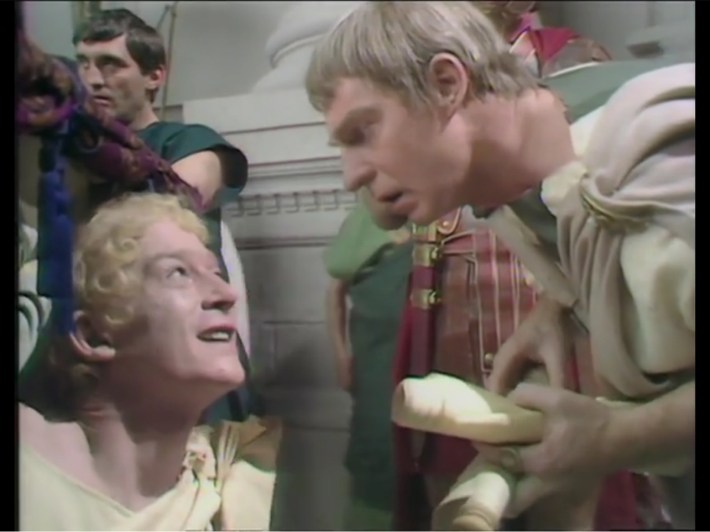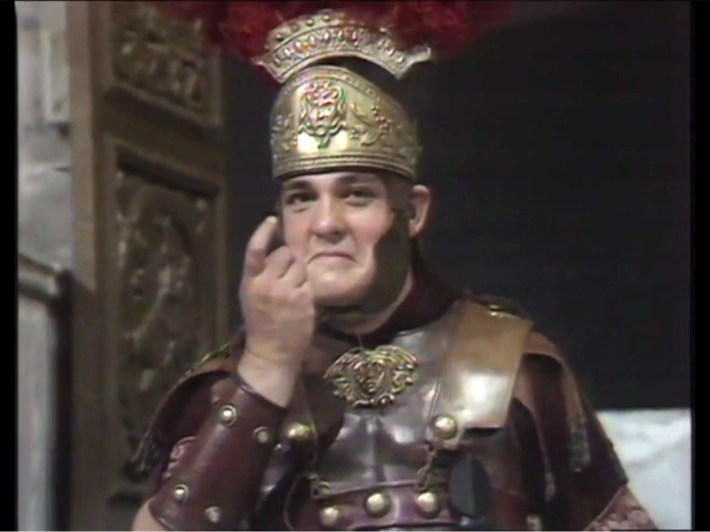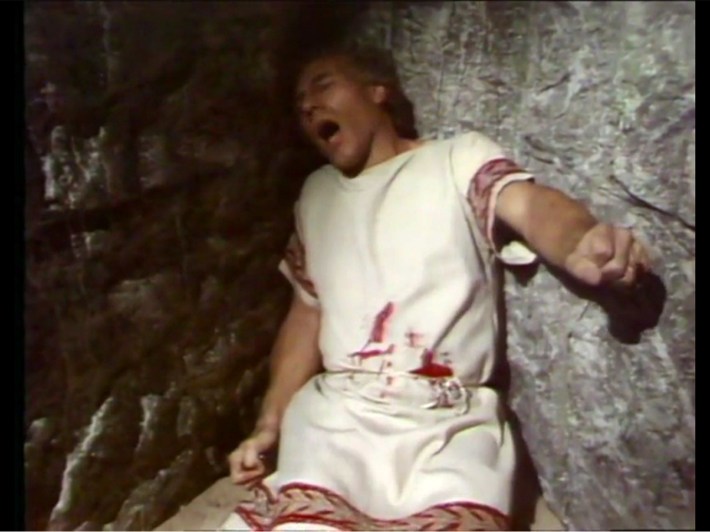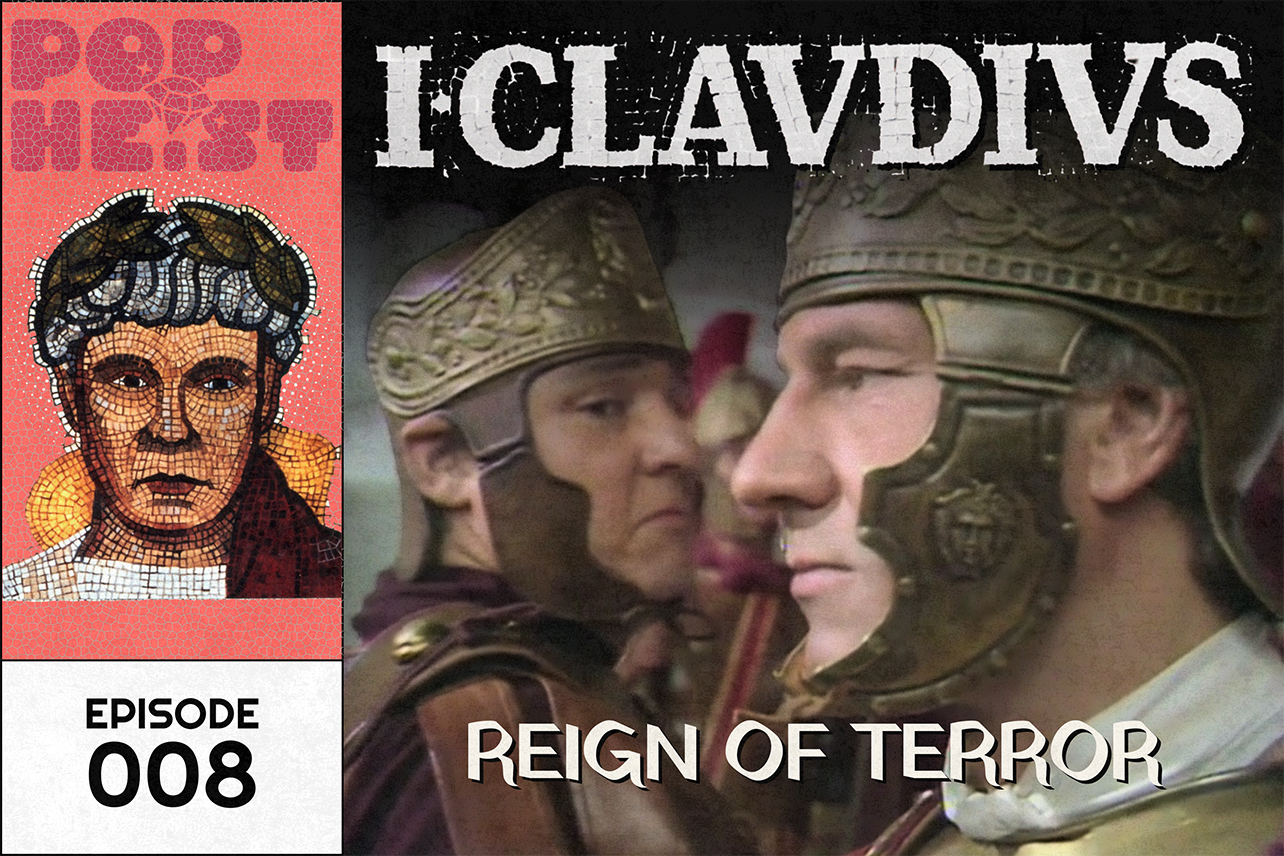In PRESTIGE PREHISTORY, Pop Heist critic Sean T. Collins takes a look at classic TV shows that paved the way for the New Golden Age of Television — challenging, self-contained series from writers and filmmakers determined to push the medium forward by telling stories their own way.
I, Claudius Episode 8
"Reign of Terror"
Original Airdate: Nov. 1, 1976
Writer: Jack Pulman (based on the novels I, Claudius and Claudius the God by Robert Graves)
Director: Herbert Wise
Cast: Derek Jacobi, Patrick Stewart, John Hurt, Patricia Quinn, George Baker, Margaret Tyzack, Fiona Walker, John Rhys-Davies, Charles Kay, Liane Aukin, Kate Lansbury
"Sign it."
"What is it?"
"A confession."
"To what?"
"Your conspiracy with Drusus to subvert the armies of the Rhine."
"Hah!"
"Sign it."
"You wrote it. You sign it."
"Sign it. You will before we've finished with you."
"I'll sign nothing for you to produce after I'm dead. Bring me to trial, or murder me and take the consequences."
"There will be no trial. I have no need of a trial to prove your guilt."
"A song sung by every small-town corrupt policeman, which is what you are, and what you should have stayed! I've watched your career with fascination, Sejanus. It's been a revelation to me. I never fully realized before how a small mind, allied to unlimited ambition and without scruple, can destroy a country full of clever men. I've seen how frail is the structure of a civilization before the onslaught of a gust of really bad breath! Yes, but I suppose you're not really the destroyer. We must look elsewhere for that. You're merely the putrefaction that spreads after death, the outward and visible sign of its presence. You're a lesson in history to me, Sejanus — proving that above all, mankind needs its sense of smell!"
Folks.
Or:
"Everyone has such a marvelous time. The stories I've heard! Do you believe them? They say he has little girls, running around the gardens, like wood nymphs, naked."
Folks.
Or:
"Rome! Rome, you are finished! Finished! You are despicable! Despicable!"
FOLKS.
There's something quite humbling about having your nation's number well and truly gotten by a television show aired in Britain in 1976, based on novels published in 1934 and 1935. But humbling isn't the right word at all. Humiliating is closer to the mark. Two thousand years after the events of I, Claudius, the United States of America — the richest and most powerful empire in the history of the world — is crumbling before our eyes due to the every combination of greed, ambition, sadism, and degeneracy that brought mighty Rome low centuries ago. We, as a species, have learned nothing.
But that's not quite fair, is it? You've learned something. I've learned something. People who have kept their minds and souls intact amidst the fascist onslaught, people who have remained human as the entire warship of the state and technology and capital aims its cannons at anything remotely human and fires — people like that, people like us, we've learned our lesson. We know that gerontocratic perverts like Emperor Tiberius, gibbering young psychopaths like Caligula, and scumbag secret police chiefs like Sejanus have been put in charge of our country, our future, our world — our children's country, our children's future, our children's world. I think what we'd like to happen to these people in return is clear enough.
I, Claudius isn't about everyday people like us, though.True, everyday people come into the story every now and then — in this very episode there's a lengthy, hilarious aside in which a scribe passive-aggressively instructs his employees to erase the beautiful elephants they've drawn on Claudius' manuscript about Carthage, seething about his rich client's bad taste all the while. Even Sejanus is, in his way, closer to the masses than the Julio-Claudians, into whose ranks he's been scheming to climb for years. But like George R.R. Martin (more on him in a moment) writing A Song of Ice and Fire, author Robert Graves and adapter Jack Pulman made a conscious choice to center royalty and aristocracy in their narrative.
But it's the powerful who move the plot here. And look where they've moved it to. Justly titled "Reign of Terror," this episode of I, Claudius is a cavalcade of cruelty — and I defy you to find a single reason why it couldn't happen here tomorrow.
The situation is simple enough to explain, as the aged Emperor Claudius does in the opening framing sequence. With Livia's death, Tiberius is completely unfettered. With no real interest in actually doing the work of running the Empire, he retires to paradisiacal Capri. On that island's sunny shores — his hair white and patchy, his face a mess of peeling skin and running sores — he indulges in his basest desires. In one memorable scene with his long-time enemy Agrippina, he's positively giddy with glee as he explains he's going to exile her to the same barren island where her mother was sent to die — then offers to pay her visits to fuck her if she wants, before flogging her for spitting in his face in response.

Needless to say, this combination of hedonism and hatred appeals deeply to Caligula, who grows more demented by the day. Here's where we need to shout out the work of the legendary John Hurt in this role — quite out of character, if you know him from the sympathetic straight arrows he's played: the chestburster's victim in Alien, Winston Smith in 1984, Aragorn in Ralph Bakshi's The Lord of the Rings, Control in Tinker Tailor Soldier Spy, even Jesus of Nazareth in History of the World Part I. ("Alright, alright! Jesus!" "Yes?" "What?" "What?" "Yes?" "Jesus!" "Yes? "What?" "What?" "You said what." "Yes?" "…Nothing.") But with his fluid yet crackling voice — it sounds like freshly laid asphalt — and dark, inscrutable eyes, he's a natural heel.
Derek Jacobi makes Hurt's performance better still. Eight episodes in, it's easy to overlook Jacobi — the same way so many people overlook his character. He's played Claudius as a teenager (I think), a young man, a man in his prime, a middle-aged man, and an old man. He's played him as a man who can control his stammer and twitch and a man who can't and a man who pretends he can't when he can. He's played him on both the outside and the inside of circles of very important people. Simply by virtue of his position in the title of the show, he's a living reminder that people like his disapproving mother Antonia and his all-powerful grandmother Livia, who both dismissed him as a fool for years, don't know everything.
Now, his role is simply to be human. As Livia explained to Caligula before she died, Claudius is too loyal a brother to Germanicus — Caligula's father, whom Caligula helped murder — to ever harm or betray his children. This even includes Caligula, whom he knows to be a soicopathic sicko who has sex with his sisters but doesn't care if his brothers live or die. As Claudius shouts as he takes his leave of Caligula in the square, "You depress me unutterably s-s-sometimes!" Of course, being the type of guy he is, he adds a curt but polite "Goodbye!"
In essence, it's Claudius's role at this stage in the series to remind us that even a world-historical villain like Caligula is still a person. If nothing else, he has an uncle who actually cares about him, even though he knows in his heart this is not a young man who deserves being cared about. Claudius is a softie like that.

But what, then, to make of what becomes of him and his wife? When the shit hits the fan and Sejanus' own number comes up, Claudius is the only thing standing between his wife, Sejanus' sister Aelia (Liane Aukin), and the rampaging security forces who are presently purging the city of the fallen martinet's friends, family, and loyalists.
Throughout the episode, Claudius has done almost nothing but express genuine shock and horror over the willingness of so many people close to him to either forsake or harm their flesh and blood — sisters, daughters, brothers, sons. But when the showdown comes, Claudius recoils from Aelia as if she's contagious, eventually reduced to scrabbling away from her on the floor as she grips his leg. She's a relative innocent in all this, guilty primarily by blood only, but — like Antonia felt of Sejanus' once-ambitious ex-wife, Apicata (Kate Lansbury) — she embodies the rot and filth of post-Augustus Rome. Even noble Claudius becomes less of a man in that filth's presence.
Two people embody Rome's ruin better than any others, now that the mass murderer Livia Drusilla is dead. The first is Emperor Tiberius, who leaves his city and his state in the hands of an ambitious murderer so he can spend his time sexually assaulting women and children with his rich and powerful friends at his island getaway. He breaks from satiating these appetites only to leverage state violence against his enemies, real or imagined.
The second is Sejanus, of whom one of his victims, Senator Gaius Asinius Gallus (a magnificent and mellifluous Charles Kay), speaks so eloquently and universally in the quote above. Arrested under patently false charges simply because he refuses to be a rubber stamp for Tiberius' and Sejanus' persecutions, he's on his Giles Corey shit, absolutely refusing to Sejanus so much as a glimpse of fear, let alone submission. He's being beaten senseless while he delivers that speech. It's incandescent.
It's Antonia of all people — proud, blind Antonia, daughter of Mark Antony, mother of the legendary Germanicus and the overlooked Claudius — who finally brings Sejanus down, because of her own daughter's involvement in his schemes. And this is where things get really dark.
Stumbling upon a cache of scrap paper from Livilla's room that was slated to be burned, Antonia discovers reams of evidence that Livilla poisoned her husband, Tiberius' son Castor, and that she's conspiring with Sejanus to kill Tiberius and place him on the throne instead. It doesn't take her long to realize that Livilla is also poisoning her daughter, Helen (Karin Foley) — a crime of passion, designed to eliminate a romantic rival, because Tiberius has arranged a marriage between Sejanus and Livilla's daughter instead of crazed Livilla herself.
In a clever bit of spycraft — this show can still be fun, you know — Antonia figures out how to pass evidence and her own warnings to Tiberius, despite Sejanus' control over his mail. She hides the incriminating documents and allegations within the scrolled pages of Claudius' latest book, a history of Carthage. The contents of the book don't matter — "The only way you would get him to read it is if you drew naked women all over it; then he'd only look at the pictures," she shouts — only that it won't raise Sejanus' suspicions when Claudius asks to deliver it as a gift.
Tiberius is aggrieved to learn his right-hand man is making a move against him, and stymied because Sejanus controls the Guard more than the Emperor himself does. Caligula, who's been tut-tut-tutting all these reports of skullduggery and debauchery with hilarious irony, suggests simply using a different overambitious soldier to overthrow the problematic one.
The man Caligula suggests is Macro (John Rhys-Davies, for crying out loud!), a bright-eyed bulldog of a man who seems to take genuine pleasure in betraying his friend in the most brutal and public manner possible. Caligula doesn't know the guy personally, "but I've slept with his wife several times" — enough times, apparently, to glean an accurate assessment of the man's character. (He certainly has never objected to a relative of the Emperor banging his wife.)

For this brilliant suggestion, Tiberius names Caligula his successor — not because he'll do a good job, but because he'll do a horrific one, which is what Rome deserves. "I will nurse you like a viper in her bosom!" he proclaims.
"Is that a joke, Uncle?" Caligula asks.
"Not yet," says the demented old pedophile with more power than anyone in the history of the world, "but it will be."
In keeping with an elaborate and disgusting scatological metaphor used by Tiberius, Sejanus and his people are purged from Rome like so much shit. Macro and his men run around slaughtering everyone they can find with a connection to the fallen commander — even his painfully adorable children. Too young, and in his daughter's case too virginal, to be killed without bringing down the wrath of the gods, the boy is dressed in a grown man's clothes and the girl is raped before they are murdered.

The once-mighty Sejanus is stabbed to death in a cell, his body dumped on the steps of the Senate along with countless others. Livilla is sealed up in her room to die of dehydration — "That is her punishment" — by her mother, Antonia, who vows to sit by the door and listen to her daughter's screams and pleas until she dies — "That is my punishment."
Claudius is left to weep and moan for what his country has become.
I found myself crying too. In large part that's down to Derek Jacobi, whose almost overwhelmingly endearing portrayal of Claudius is only made more so by the way he refuses to shy away from the character's less pleasant traits — his treatment of his wives and his absent child(ren?), his chameleonic ability to dodge the wrath of lunatics like Livia and Tiberius and Caligula and Sejanus by playing the fool or kissing the ring. (The scene where he awkwardly endures having his hands held by his mother and wife simultaneously is a scream.) Because you've seen the way he can be when he doesn't care, it's all the more affecting when he does.

Claudius' love for his brothers and friends, his care for the undeserving Caligula and Livilla, his horror at Caligula and Antonia's indifference to the fates of their flesh and blood, above all his utter abjection upon hearing of the abuse and murder of Sejanus' children, even things as simple as his love of history and the Republic — he's a tremendously empathetic character because he, himself, is tremendously empathetic with others.
To watch him break down to an almost animal degree out of disgust with how badly people — the people in charge most of all — can treat other people was simply too much for me. It is horrifying and depressing to be ruled by pedophiles, rapists, and murderers; more horrifying still is the pressure not to be horrified by it. Not if you know what's good for you.
This recap was originally accessible to paid subscribers only, and future recaps in this series are available now for paid subscribers. If you haven't already, consider supporting worker-owned media by subscribing to Pop Heist. We are ad-free and operating outside the algorithm, so all dollars go directly to paying the staff members and writers who make articles like this one possible.






